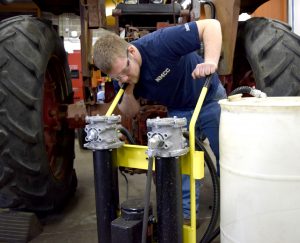Diesel Hydraulics “Greens” Their Program
Northern Maine Community College has purchased two new pieces of equipment that will have significant positive environmental impact. The Diesel Hydraulics program will now benefit from a single-filter fuel unit and a double-filter kidney machine, which have the capability of cleaning diesel fuel and hydraulic oil that would otherwise be a waste byproduct.
When students repair diesel machines, they often need to remove fuel tanks to access the transmission, frame, or cab. In order to do this, the fuel needs to be extracted from the tank, which contaminates the fuel and oil through environmental exposure. Therefore, technicians have been unable to reuse the fuel, resulting in waste. This has always been a focus of concern for NMCC Diesel Hydraulics instructor, Bob Rice.
“Our old process for removing fuel took a lot of time and could be very messy,” said Rice. “The new equipment provides a better process of operating that is environmentally sound and will reduce the waste fuel stream considerably.”
The single-filter fuel unit allows students to vacuum fuel out of a tank with better control. As the fuel is suctioned, it is also filtered and cleaned. When the students are ready to return the fuel to the tank, the fuel is filtered a second time, producing a clean and contaminant-free reusable fuel.
“This is significant for us. We did not have anything like this before and it is environmentally responsible to recycle these materials,” said Pam Buck, NMCC Trade and Technical Department Chair, “Green technology is not something you usually associate with diesel hydraulics.”
The second piece of equipment is a double-filter unit (kidney machine), used to filter hydraulic oil in a similar fashion. Hydraulic oil can be very expensive. It is anticipated that the kidney machine will end up paying for itself in hydraulic oil savings within eighteen months.

Mitchell Pelletier checks the gauge on the kidney machine as it processes hydraulic oil.
There are additional perks associated with the green equipment.
“The College is always looking for ways to reduce its carbon footprint and also keep up with innovative industry trends. This new equipment does both of those things. Our students will have the opportunity to simultaneously participate in responsible green solutions and utilize new technology methods,” said Rice, “and that’s a win-win for everyone.”




